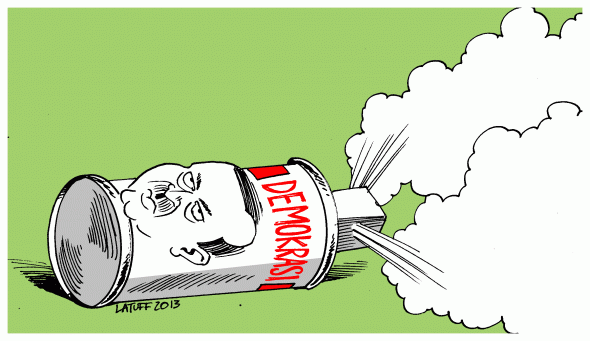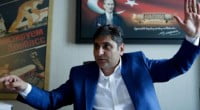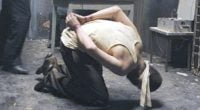“I am behind them 100 percent on the issue in the fight against terrorism,” Aslan said. “They should lock up all of the (pro-Kurdish) legislators.”
Asked whether he has concerns about the direction Turkey is taking, Aslan said: “I am more concerned about the state of the economy, the rise of the dollar and how it is affecting my business.”
Since the thwarted coup blamed on a network of followers of U.S.-based Muslim cleric Fethullah Gulen, Turkey has engaged in an unprecedented crackdown, jailing tens of thousands as part of an investigation into the failed power grab and dismissed or suspended 120,000 suspected of links to the cleric, shut down more than 170 media outlets, detained more than 140 journalists, sacked elected Kurdish mayors and replaced them with government-appointed trustees.
The troubling clampdown comes as Turkey was already in turmoil, rocked by a wave of deadly suicide attacks, including one at Istanbul’s busiest airport that killed 54 people. The country is also engaged in renewed conflict with PKK rebels after the collapse of peace efforts, is militarily involved in operations in Syria and Iraq and grappling with 3 million refugees from those two neighboring countries. Earlier this month, Washington said it was ordering the families of U.S. diplomatic staff in Istanbul to leave Turkey over security concerns.
Despite some calls for the suspension of Turkey’s accession talks, the EU has its hands tied over the migrant issue. In a recent meeting in Brussels, top European diplomats struggled to reach a common stance over Turkey as they walked a tight rope trying to balance their concerns over what they say are rights abuses with their continued need for Turkish support to stem the flow of migrants heading to Europe.
Few believe that a U.S. administration under President-elect Donald Trump would make an issue of the degrading rights and freedoms in Turkey as he will seek to improve ties with a strategic partner. Relations were strained under President Barack Obama over Washington’s support for Syrian Kurdish militia, which Turkey regards as terrorists, and Turkish perceptions that Washington is reluctant to extradite a cleric blamed by Ankara for the coup.
“In the big picture, Erdogan knows that the EU needs Turkey and will come back begging for a new agreement on the migrants. That’s why he will play a game of brinksmanship,” said Soner Cagaptay, the director of the Turkish program at The Washington Institute. “Come spring, when the Aegean becomes possible again for crossings, the potential for refugees goes up. That’s when Turkey’s leverage on the EU increases.”
Cagaptay said Trump would likely give Erdogan a “free pass” as long as he has the Turkey president’s support in the fight against IS.
“Trump has one objective: unconditional and complete Turkish support for the fight against ISIS,” Cagaptay said, using an alternative acronym for the extremist group. “He will care very little about what goes on domestically. Erdogan will get a blank check for his executive presidency.”
Critics, human rights groups and Western allies claim Erdogan is taking advantage of the state of emergency, declared to facilitate the prosecution of coup plotters, to instead jail and intimidate opponents.
The government says it’s forced to purge Gulen’s followers from all state institutions to protect Turkey from new attempts to topple the government and has to take tough anti-terror measures at a time when it is under attack from multiple banned groups that have carried out a string of bombings over the past 18 months.
Over the past few weeks alone, authorities have incarcerated 10 members of parliament from Turkey’s pro-Kurdish party as well as the editor and nine senior staff of the Cumhuriyet newspaper — one of the few remaining opposition news outlets — all on terror-related charges. Close to 400 civic associations were closed down, universities were barred from electing their presidents and prosecutors demanded a life prison term for novelist Asli Erdogan, who also wrote for a newspaper accused of being the mouthpiece of the outlawed Kurdish rebels.
Erdogan and government officials accuse the West of failing to understand the gravity of the attempted coup, which saw renegade military personnel attack parliament and other government buildings with jets, tanks and helicopters, as well as the continued threat posed by the Gulen movement.
In addition, Turkish leaders frequently accuse Germany and other EU countries of harboring wanted Kurdish militants and treating Turkey unfairly by placing hurdles in the way of its EU bid.
“On the one hand you declare the PKK a terror group … but then you show this terror organization tolerance and you even give it direct or indirect support,” Erdogan said. “What kind of a friendship is this?”
Erdogan rejects accusations that rights and freedoms are being suppressed.
“There is no such problem in my country. Anyone can say what they like and live the way they like, dress the way they like, eat and drink as they want. We have not barred anything,” Erdogan told Al Jazeera television last week, according to comments that were carried by Turkey’s state-run Anadolu Agency. “Turkey has not become a country where bans are imposed. Turkey has in no other period experienced such freedom, such tranquility and such comfort.”
“Turkey is now going through a dark and authoritarian coup staged by the presidential palace under the pretext of fighting against (the Gulen movement),” the main opposition Republican Peoples’ Party, or CHP, said in a declaration issued earlier this month. “The current political situation poses a serious threat against the freedom of our people and the future of our country.”
Expressions of concern from Western allies spark angry response from Erdogan whose almost daily speeches are laced with anti-EU and anti-U.S. rhetoric.
Amid the threats from some EU countries to freeze Turkey’s EU membership talks, Erdogan challenged the EU to cut off the talks completely and later also suggested Turkey could hold a referendum to let the people decide on whether Ankara should press ahead with its efforts to join the bloc. In comments reported in Hurriyet newspaper on Sunday, Erdogan also suggested that the Shanghai Cooperation Organization — made up of China, Russia and Central Asian nations — could be an alternative to the EU.
Last week, Erdogan called on his supporters: “Take no notice of what the West or others say. Look at what Allah says. That’s what we are doing.”

























